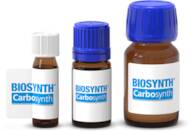Methadp
CAS: 3768-14-7
Rif. 3D-DAA76814
| 1mg | Fuori produzione | ||
| 2mg | Fuori produzione | ||
| 5mg | Fuori produzione | ||
| 10mg | Fuori produzione | ||
| 25mg | Fuori produzione |
Informazioni sul prodotto
- 5'-O-[hydroxy(phosphonomethyl)phosphoryl]adenosine
- 5′-Adenylyl methylenephosphonate
- 9-{5-O-[hydroxy(phosphonomethyl)phosphoryl]-beta-L-ribofuranosyl}-9H-purin-6-amine
- 9-{5-O-[hydroxy(phosphonomethyl)phosphoryl]pentofuranosyl}-9H-purin-6-amine
- Adenosine 5'-methylenediphosphate
- Adenosine 5′-(α,β-methylene)diphosphate
- Adenosine α,β-methylenediphosphate
- Adenosine, 5'-(trihydrogen methylenebis(phosphonate))
- Adenosine, 5′-(trihydrogen methylenediphosphonate)
- Adenosine, 5′-[hydrogen P-(phosphonomethyl)phosphonate]
- Vedi altri sinonimi
- Adenosine, 5′-methylenediphosphonate
- Ampcp
- Aopcp
- MethADP
- Nsc 614641
- α,β-Methylene adenosine 5′-diphosphate
- α,β-Methylene adenosine diphosphate
- α,β-Methylene-5′-ADP
- α,β-Methylene-ADP
Methadone is a synthetic opioid that inhibits the neuronal release of glutamate, acetylcholine and other neurotransmitters. Methadone binds to the mu-opioid receptor and has been used in the treatment of heroin addiction. Methadone also reduces tissue damage caused by ischemia-reperfusion injury. Methadone is effective at reducing ATP levels by inhibiting ATPase activity in fat cells. This inhibition can be reversed by increasing the availability of ATP, either through administration of adenosine or through administration of substances that inhibit phosphodiesterases.





